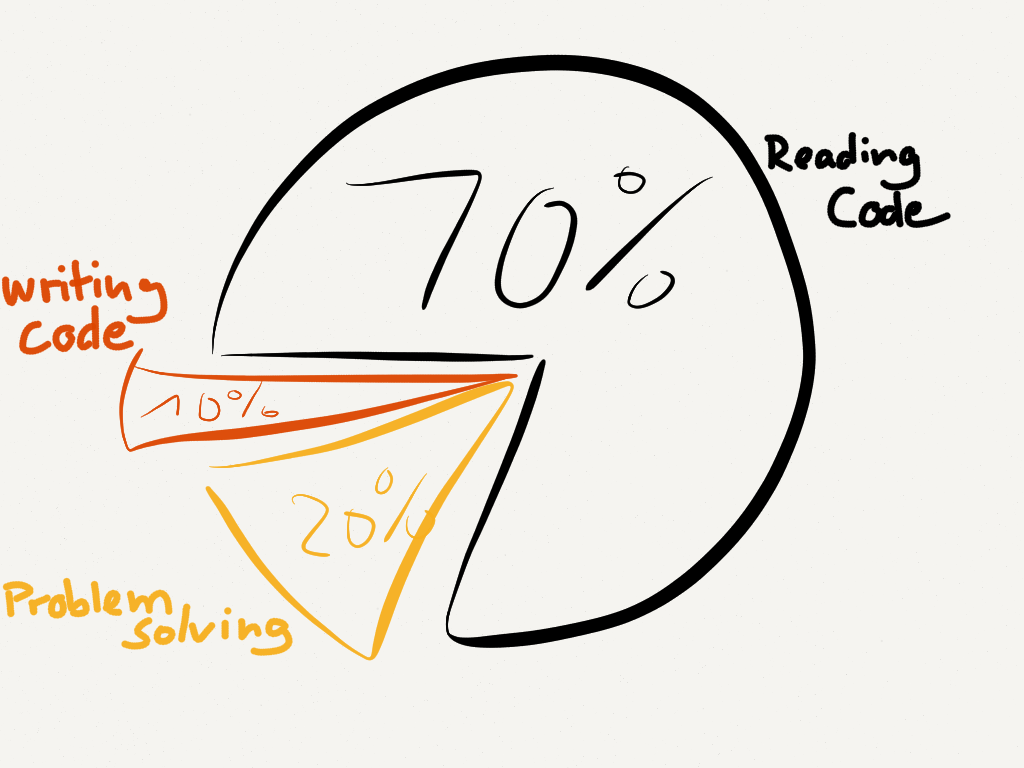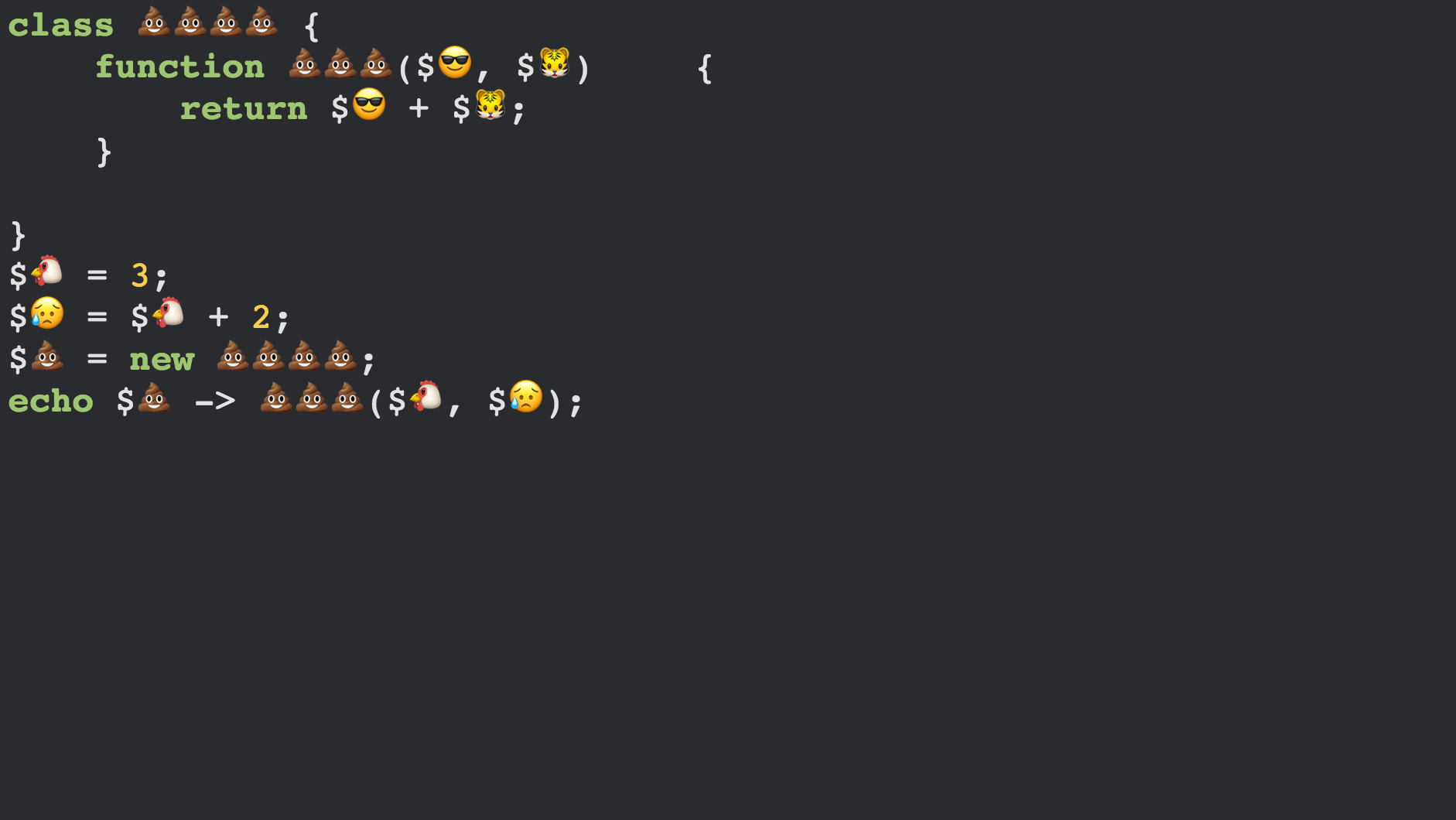2nd hardest thing in computer science
@pawel_lewtak

Paweł Lewtak
Developer @ GOG.com
Definition?
"There are only two hard things in Computer Science: cache invalidation and naming things."
Phil Karlton
"There are 2 hard problems in computer science: cache invalidation, naming things, and off-by-1 errors"
Leon Bambrick
#2 Naming things*
*things
- variables
- methods
- classes
- modules
- comments
- inline docs
- commit messages
You don't code for CPU
You don't code for interpreter
You don't code for compiler


You code for people
You code for other developers
You code for your future self
Don't code,
wrote prose

"Instead of imagining that our main task is to instruct a computer what to do, let us concentrate rather on explaining to human beings what we want a computer to do."
Donald E. Knuth
Source: Literate Programming, 1983
Comprehension
~70%
function a($b) {
sort($b);
$c = count($b);
if ($c % 2 === 1) {
return $b[($c - 1) / 2];
} else {
return ($b[$c/2 - 1] + $b[$c/2]) / 2;
}
}
function median($pool) {
sort($pool);
$size = count($pool);
if ($size % 2 === 1) {
return $pool[($size - 1] / 2];
} else {
return ($pool[$size/2 - 1] + $pool[$size/2]) / 2;
}
}
Self-documenting code
Programming is mapping
- from problem domain
- via intermediate domain
- into programming domain
DDD FTW
Worst variable name
data

Second worst name?
data2
$total = $price * $qty;
$total2 = $total - $discount;
$total2 += $total * $taxrate;
$total3 = $purchase_order_value + $available_credit;
if ($total2 < $total3) {
echo "You can't afford this order.";
}
$order_total = $price * $qty
$payable_total = $order_total - $discount
$payable_total += $payable_total * $taxrate
$available_funds = $purchase_order_value + $availble_credit
if ($payable_total < $available_funds) {
echo "You can't afford this order.";
}
"No-one sets out to write legacy code"
Rachel Willmer
Broken window theory
Code will decay
Design patterns
Misapplied Java design patterns
are the root of all AbstractWordFactoryFactory("evil")
HN comment
Naming conventions
TL;DR
- CamelCaseClass
- methodName
- someVariable
- CAPITAL_CONSTANT
syntax < semanthics
Common issues
Pseudo getter
get_data()
with extra operations inside
get_create_object()
- fetch
- find
- lookup
- create
- calculate
Not really a boolean
is_active()
function is_active() {
if (cond) {
return 'false';
}
return 'true';
}is_valid()
function is_valid() {
if (input_is_valid) {
return true;
}
}Plural / singular names
function get_person() {
return ['John Doe', 'Jane Doe'];
}
function get_employers() {
return 'John Doe';
}Misleading docs
function get_lowest_price($user) {}/**
* Actually it returns the highest price.
*/
function get_lowest_price($user) {}
/**
* Actually it returns the highest price.
*/
function get_lowest_price($user) {
if ($user === null) {
return _get_highest_price();
} else {
return _get_lowest_price($user);
}
}
More than one responsibility
Abbreviations
pos
mod
abs
authSynonyms
<ThatThing>Manager
- UserManager
- StringManager
- ProductManager
- etc.
Alternatives
- Builder
- Writer
- Adapter
- Factory
- Handler
- Provider
- Converter
Magic numbers
$client = new GuzzleHttp\Client();
$url = 'https://conference.phpbenelux.eu/';
$response = $client->request('GET', $url);
$response_code = $response->getStatusCode();
if ($response_code === 200) {
echo 'It works!';
} elseif ($response_code === 418) {
echo 'What is that?!';
}$client = new GuzzleHttp\Client();
$url = 'https://conference.phpbenelux.eu/';
$response = $client->request('GET', $url);
$response_code = $response->getStatusCode();
if ($response_code === StatusCode::OK) {
echo 'It works!';
} elseif ($response_code === StatusCode::IM_A_TEAPOT) {
echo 'Website down. Would like a cup of tea instead?';
}Useless comments
/**
* Returns the data.
*/
function get_data() {}
/**
* Return maximum ID value from the database.
*/
function get_max_id_from_db() {}
Explain why,
not what or how
"Code should have comments, but if your file is more than 25% comments, that's a red flag: you may be explaining bad code"
Adam Culp
Commit messages

Bad name:
- Does more that what is says
- Says more than what it does
- Does the opposite
- Contains more than what it says
- Says more than what it contains
- Contains the opposite
Good practices
Specific names
No generics
Short names
Do not use negation
is_not_enabled()
is_disabled()
Consistent names
Code & docs
Single responsibility
Domain terms
Think about it
ASCII only
$Δ = 1;
++$Δ;
echo $Δ;class 💩💩💩💩 {
function 💩💩💩($😎, $🐯) {
return $😎 + $🐯;
}
}
$🐔 = 3;
$😥 = $🐔 + 2;
$💩 = new 💩💩💩💩;
echo $💩 -> 💩💩💩($🐔, $😥);

Hungarian notation
hostList, hostSet => hosts, validHosts
valueString => firstName, lowercasedSKU
intNumber => accountNumberTests!
Commit message
Good commit message
-
Speeds up review process
-
Helps write release notes
-
Helps future maintainers
Short (50 chars or less) summary of changes
More detailed explanatory text, if necessary. Wrap it to about 72
characters or so. In some contexts, the first line is treated as the
subject of an email and the rest of the text as the body. The blank
line separating the summary from the body is critical (unless you omit
the body entirely); tools like rebase can get confused if you run the
two together.
Further paragraphs come after blank lines.
- Bullet points are okay, too
- Typically a hyphen or asterisk is used for the bullet, preceded by a
single space, with blank lines in between, but conventions vary here
Source: Source: http://git-scm.com/book/ch5-2.html
How?
Agree on standards
Boy Scout Rule
Practice
Improve vocabulary
Refactor
Code reviews
Short, bite size, single logical change
Code ownership
Commit messages
Research papers
- https://www.cqse.eu/publications/2005-concise-and-consistent-naming.pdf
- http://www.cs.loyola.edu/~lawrie/papers/lawrieJese07.pdf
- https://www.researchgate.net/publication/224079441_Relating_Identifier_Naming_Flaws_and_Code_Quality_An_Empirical_Study
- http://www.veneraarnaoudova.com/wp-content/uploads/2014/10/2014-EMSE-Arnaodova-et-al-Perception-LAs.pdf
Thank you!
Questions?
2nd hardest thing in computer science
By Paweł Lewtak
2nd hardest thing in computer science
- 483



